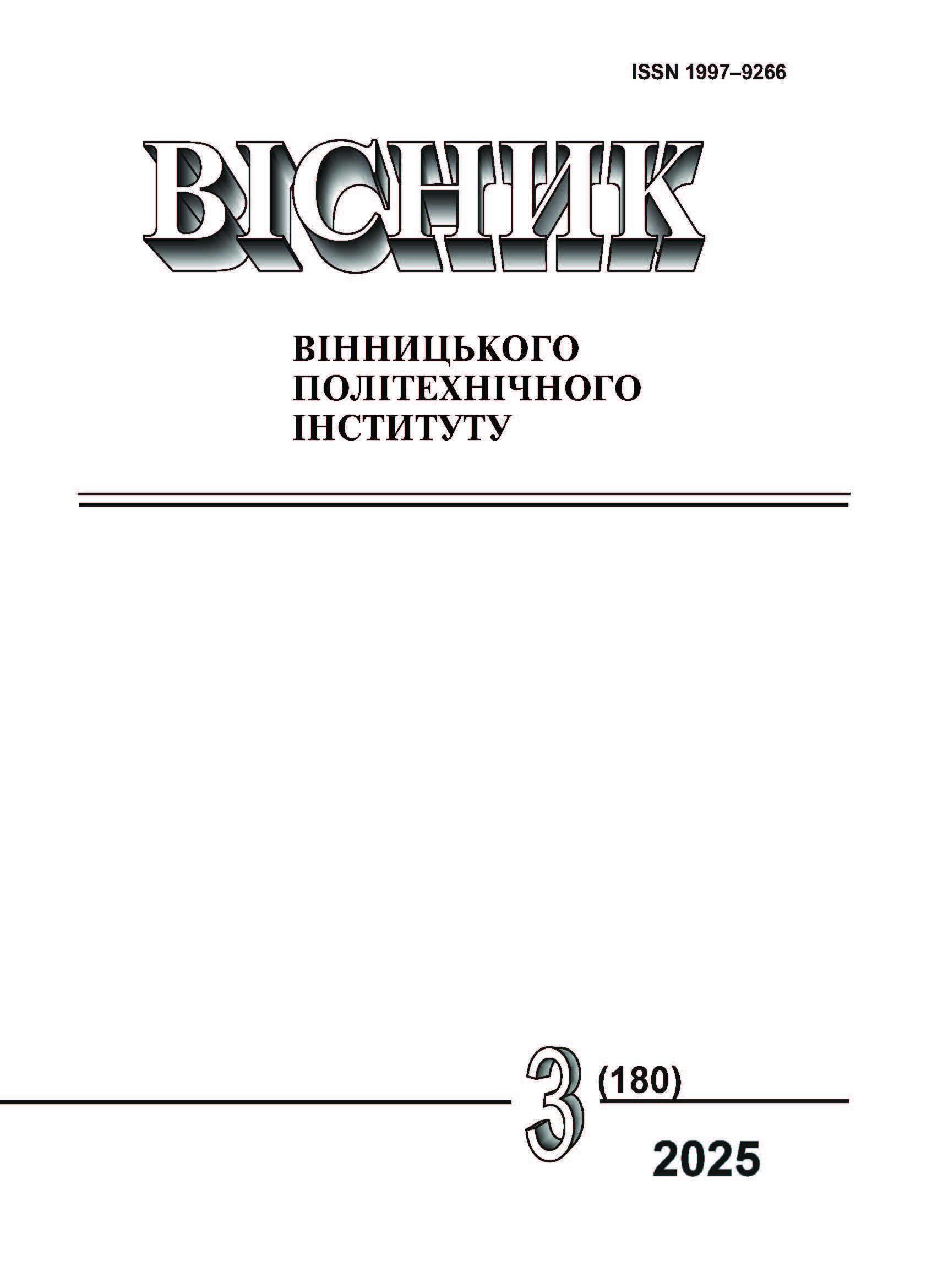ДОСЛІДЖЕННЯ ЕНТРОПІЙНИХ ОЦІНОК ДІАГНОСТИЧНИХ ХАРАКТЕРИСТИК ТЕХНОЛОГІЧНИХ СИСТЕМ НА ОСНОВІ ЙМОВІРНІСНИХ РОЗПОДІЛІВ
DOI:
https://doi.org/10.31649/1997-9266-2025-180-3-168-177Ключові слова:
ентропія Шеннона, діагностика технологічних систем, статистичні розподіли, магніто-резонансна обробка, спектральна ентропія, інформаційна невизначеність.Анотація
Здійснено поєднання теоретичних положень і практичних експериментів для обґрунтування універсального інформаційного підходу до діагностики технологічних систем. На початку дослідження автори звертаються до фундаментальних ідей ентропії Шеннона як міри невизначеності, пояснюючи її роль у кількісному оцінюванні інформаційної насиченості діагностичних сигналів. Головна ідея полягає в тому, що традиційні статистичні характеристики — математичне сподівання чи дисперсія — не завжди дозволяють вичерпно описати складні структурні зміни в матеріалах, особливо в умовах магніто-резонансної обробки. Саме тому розроблено підхід, який дає змогу порівнювати різні ймовірнісні моделі за єдиною інформаційною шкалою. Детально представлено методологію, яка передбачає побудову єдиного коректованого простору параметрів: всі розподіли вирівнюються за спільними характеристиками середнього значення та розсіювання, що забезпечує безпристрасне порівняння. На прикладі п’яти матеріалів — сталі, міді, дюралюмінію, текстоліту й органічного скла — проведено моделювання спектральних відгуків у відповідь на широкосмугове вібраційне збудження в постійному магнітному полі. Для кожного зразка отримано амплітудно-частотні характеристики, що дозволило виявити унікальні «спектральні відбитки» матеріалів. Висока упорядкованість сталевого відгуку, проявлена вираженим резонансним піком, протиставляється практично рівномірному спектру діелектриків, що свідчить про різні механізми взаємодії широкосмугових вібрацій і магнітного поля з матеріалом. Результати демонструють, що спектральна ентропія є чутливим індикатором структурних змін: зменшення її значення корелює зі зростанням впорядкованості матеріалу, а підвищена ентропія вказує на рівномірний розподіл енергії по частотах. На основі отриманих даних сформульовано практичні рекомендації щодо вибору оптимальних статистичних моделей для різних класів матеріалів: наприклад, для феромагнітних металів доцільно використовувати розподіли з більшою вагою важких «хвостів», тоді як для неметалевих матеріалів — моделі з максимальною інформаційною невизначеністю. Запропонований підхід відкриває нові перспективи для інформаційно-орієнтованої діагностики та неруйнівного контролю, сприяючи підвищенню надійності та ефективності технологічних процесів у машинобудуванні та матеріалознавстві.
Посилання
Y. Xu, S. Kohtz, J. Boakye, P. Gardoni, and P. Wang, “Physics-informed machine learning for reliability and systems safety applications,” State of the art and challenges. Reliability Engineering & System Safety, vol. 230, 2023. Art. 108900. https://doi.org/10.1016/j.ress.2022.108900 .
Ferial ElRobrini, Syed Muhammad Salman Bukhari, Muhammad Hamza Zafar, Nedaa Al-Tawalbeh, Naureen Akhtar, and Filippo Sanfilippo, “Federated learning and non-federated learning based power forecasting of photovoltaic/wind power energy systems,” A systematic review. Energy and AI, vol. 18, 2024. Article 100438. ISSN 2666-5468. https://doi.org/10.1016/j.egyai.2024.100438 .
Chen Zheyi, et al., “Evolution and Prospects of Foundation Models: From Large Language Models to Large Multimodal Models,” Computers, Materials and Continua, vol. 80, Iss. 2. pp. 1753-1808, 2024. ISSN 1546-2218. https://doi.org/10.32604/cmc.2024.052618 .
С. І. Перевозніков, Н. О. Біліченко, i В. С. Озеранський, Теорія інформації та кодування. Вінниця, Україна: ВНТУ, 2017, 82 с.
В. П. Майданюк, О. Н. Романюк, i С. Є. Тужанський, Основи теорії інформації та кодування, електр. навч. посіб. комбінованого використання. Вінниця, Україна: ВНТУ, 2022, 133 с.
D. C. Christie, “Efficient estimation of directional wave buoy spectra using a reformulated Maximum Shannon Entropy Method: Analysis and comparisons for coastal wave datasets,” Applied Ocean Research, vol. 142, 2024. Article 103830. https://doi.org/10.1016/j.apor.2023.103830. ISSN 0141-1187 .
W. Salkeld, “Small ball probabilities, metric entropy and Gaussian rough paths,” Journal of Mathematical Analysis and Applications, vol. 506, Iss. 2, 2022. Article 125697. https://doi.org/10.1016/j.jmaa.2021.125697 .
E. Suhir, “Double-exponential-probability-distribution-function and it’s applications in some critical aerospace safety problems,” Perspective and brief review. Microelectronics Reliability, vol. 159, 2024. Article 115439. https://doi.org/10.1016/j.microrel.2024.115439 .
N. A. Spencer, and J. W. Miller, “Strong uniform laws of large numbers for bootstrap means and other randomly weighted sums,” Statistics & Probability Letters, vol. 211, 2024. Article 110144. https://doi.org/10.1016/j.spl.2024.110144 .
M. Kreer, A. Kizilersu, and A. W. Thomas “When is the discrete Weibull distribution infinitely divisible?” Statistics & Probability Letters, vol. 215, 2024. Art. 110238. https://doi.org/10.1016/j.spl.2024.110238 .
P. J. Forrester, “On the gamma difference distribution,” Statistics & Probability Letters, vol. 211. 2024. Art. 110136. https://doi.org/10.1016/j.spl.2024.110136.
R. Tomaschitz, “Multiply broken power-law densities as survival functions: An alternative to Pareto and lognormal fits,” Physica A: Statistical Mechanics and its Applications, vol. 541. 2020. Article 123188. https://doi.org/10.1016/j.physa.2019.123188 .
J. Krotz, M. R. Sweeney, C. W. Gable, J. D. Hyman, and J. M. Restrepo, “Variable resolution Poisson-disk sampling for meshing discrete fracture networks,” Journal of Computational and Applied Mathematics, vol. 407, 2022. Article 114094. ISSN 0377-0427. https://doi.org/10.1016/j.cam.2022.114094 .
С. В. Ковалевський, О. С. Ковалевська, i Ю. В. Лупа, «Підвищення експлуатаційних характеристик деталей машин на основі комбінованого впливу сильних магнітних полів,» Зб. наук. праць Дніпровського державного технічного університету. Технічні науки, вип. 2, с. 29-36, 2021.
S. Kovalevskyy, and O. Kovalevska, “New opportunities for processing materials in a strong magnetic fields,” Технічні науки та технології, науковий журнал, Національний університет «Чернігівська політехніка», № 4 (26), c. 7-14, 2021.
S. Kovalevskyy, and O. Kovalevska, “Identification and Technological Impact of Broadband Vibration on the Object,” Papers from the 3rd Grabchenko’s International Conference on Advanced Manufacturing Processes (InterPartner-2021), September 7-10, 2021, Odessa, Ukraine. ABCM Series on Mechanical Sciences and Engineering. Lecture Notes in Networks and Systems, pp. 78-87. https://doi.org/10.1007/978-3-030-91327-4_8 .
##submission.downloads##
-
pdf
Завантажень: 36
Опубліковано
Як цитувати
Номер
Розділ
Ліцензія

Ця робота ліцензується відповідно до Creative Commons Attribution 4.0 International License.
Автори, які публікуються у цьому журналі, згодні з такими умовами:
- Автори зберігають авторське право і надають журналу право першої публікації.
- Автори можуть укладати окремі, додаткові договірні угоди з неексклюзивного поширення опублікованої журналом версії статті (наприклад, розмістити її в інститутському репозиторії або опублікувати її в книзі), з визнанням її первісної публікації в цьому журналі.
- Авторам дозволяється і рекомендується розміщувати їхню роботу в Інтернеті (наприклад, в інституційних сховищах або на їхньому сайті) до і під час процесу подачі, оскільки це сприяє продуктивним обмінам, а також швидшому і ширшому цитуванню опублікованих робіт (див. вплив відкритого доступу).





